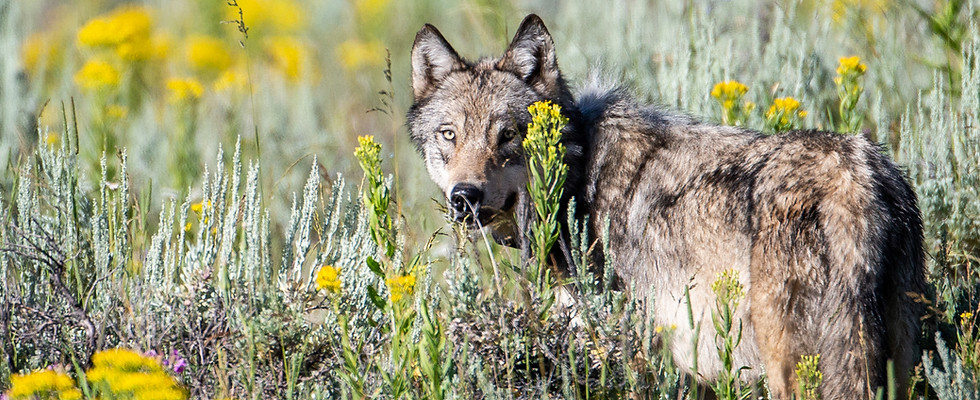Wild Livelihoods Public Comment on 2025-2026 Wolf Hunting and Trapping Quotas

The Montana Fish and Wildlife Commission is preparing to make critical decisions about the 2025-2026 wolf hunting and trapping quotas on Thursday, August 21st. The Stakes Are High. We have learned that Howl, a pro-predator hunting group, has submitted 7,000 public comments supporting increased wolf hunting. The business community must mobilize now to ensure our economic interests and sustainable wildlife management are represented. Your voice is crucial in this process. Read on to learn more and express your concerns to decision makers.
Wild Livelihoods' Position
–We OPPOSE setting the Region 3 quota at 80 wolves and SUPPORT decreasing the Region 3 quota to 52 given the wolf population is trending down even with last year's quota of 52 wolves in Region 3. The 2025 proposed quota of 80 wolves in Region 3 is a 58% increase since 2022, even though FWP's 2024 Annual Report shows a five-year declining wolf population trend in Region 3 while other regions remain stable.

– We SUPPORT Maintaining the quota of 3 wolves in Wolf Management Units (WMUs) 313 and 3 wolves in WMU 316 as proposed by the Commission. These are the small areas of Montana adjacent to Yellowstone National Park where wolves are hunted.
– We OPPOSE any move toward state-wide wolf quotas and prefer that the department continue to monitor and manage wolf populations in previously established Regions.
– We OPPOSE extending the wolf hunting season beyond the 2024/25 season dates, because it will affect our safety, recreation and wildlife tourism which drives our local economy.
The Economic Reality
Wildlife generates significant economic value for Park County, Montana.
Yellowstone wolf tourism alone generates roughly $82 million annually for gateway communities, $500 million annually for Park County, and over $1 billion annually for Montana’s Greater Yellowstone tourism economy. Park County bed taxes average $8M annually to the state's benefit, including some of it going to FWP. The omission of these figures presents an incomplete cost-benefit analysis and biases policy toward consumptive uses of wildlife rather than also recognizing non-consumptive economic drivers.
Critical Dates & Action Items
Write or call individual Commissioners by August 20th.
The public comment period via the portal has closed. Emails to Commissioners are submitted for public record. Below are talking points to make your own. Be respectful and to the point in your emails. Do not use moral language, economics is the only argument.
Commission Meeting: August 21, 2025
- Location: Montana WILD Auditorium, Helena, MT
- Time: 8:30 AM
- Virtual Option: Available via Zoom
- IMPORTANT: If attending via Zoom, you MUST register by noon on August 20, 2025
Call to Action
Montana Fish and Wildlife Commissioners Contact Information
Region 1 - Ian Wargo
- Email: CommissionerRegion1@mtfwp.org
- Phone: (406) 438-1714
- Location: Kalispell, Montana
Region 2 - Jeff Burrows
- Email: CommissionerRegion2@mtfwp.org
- Phone: (406) 438-1148
- Location: Hamilton, Montana
Region 3 - Susan Brooke (Commission Chair)
- Email: CommissionerRegion3@mtfwp.org
- Phone: (406) 438-0460
- Location: Bozeman, Montana
Region 4 - K.C. Walsh (Vice Chair)
- Email: CommissionerRegion4@mtfwp.org
- Phone: (406) 438-3625
- Location: Martinsdale, Montana
Region 5 - Brian Cebull
- Email: CommissionerRegion5@mtfwp.org
- Phone: (406) 438-2551
- Location: Billings, Montana
Region 6 - Lesley Robinson
- Email: CommissionerRegion6@mtfwp.org
- Phone: (406) 301-0787
- Location: Zortman, Montana
Region 7 - Bill Lane
- Email: CommissionerRegion7@mtfwp.org
- Phone: (406) 438-0143
- Location: Ismay, Montana
Talking Points
When calling or emailing commissioners, be personable by introducing yourself as a Montanan (if applicable), share your background and describe your business. Your voice as a local resident carries significant weight in these decisions.
The proposed quota for Region 3 is too high — the Commission needs to cap it at last year's level of 52 wolves. FWP's 2024 Annual Report shows a five-year wolf population decline in Region 3, while other regions remain stable.
The 80-wolf quota represents a dangerous increase — this is a 58% jump since 2022 despite declining wolf numbers. FWP's own data contradicts the need for higher quotas in a region where populations are already dropping.
Keep the 3-wolf quotas in WMUs 313 and 316 — these small areas bordering Yellowstone National Park need continued protection. Wolf tourism brings $82 million annually to gateway communities and supports thousands of jobs.
Don't extend the hunting season — A longer hunting season threatens public safety and recreation. An extended seasons could harm pups and lactating females, and eliminating trapping setbacks endangers people and pets on our public lands.
Nine Critical Amendments
Currently, the season setting includes nine amendments that affect various aspects of wolf management. Pay attention to them and voice your concern as you feel fit. For example, season extensions create a conflict of interest for recreational activities and pet exercise on public lands, livestock grazing, and hunting and trapping operations.
Because all nine amendments interconnect, we recommend writing directly to Commissioners rather than submitting individual comments on amendments through the portal.
Check list
-
Email your written comments to Commissioners directly by August 20th, 2025
-
Register for the August 21 MTFWP Commission meeting if you plan to attend virtually by August 20th by noon.
-
Keep comments respectful, factual, and focused on economic impacts
-
Share this information with your network
Remember: If we don't stand up for wildlife and our livelihoods, no one else will. The future of sustainable wildlife management and tourism-dependent businesses in Montana depends on balanced, science-based decisions that consider both conservation and economic realities.